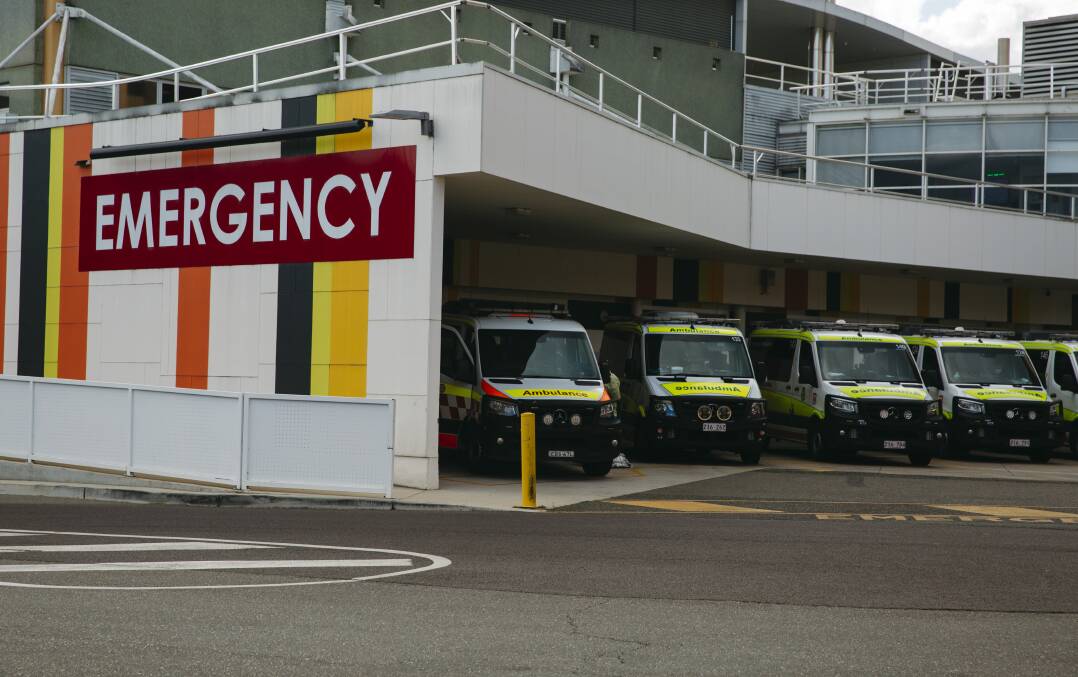Australia's health system "has never been in a worse state" and avoidable outcomes, including deterioration and sometimes death, are becoming normal, findings from a new report have shown.
The report shows people are waiting longer than ever before to access treatment and emergency departments, with data showing the ACT's performance has declined over the past five years.
The Australasian College for Emergency Medicine has released a report, which has shown how emergency departments across Australia performed in 2020-21.
The college's president Clare Skinner said the report highlighted the health system has never been in a worse state.
"Emergency department over crowding, ambulance ramping, overly long waits for care, burnt out healthcare workers leaving the sector, and adverse outcomes for patients - including avoidable deterioration and sometimes death - are becoming 'normal'," Dr Skinner said in her introduction.
For the ACT, the report found 66 per cent of patients who were discharged, or not subsequently admitted to hospital, left the territory's emergency departments within four hours.
This number has declined over the past five years. In 2016-17, 83 per cent of all discharged patients left the department within four hours.
For patients who were admitted, only 38 per cent were given a bed outside the department within four hours of arrival. Five years ago, 51 per cent were given a bed within four hours of arrival.
More than one-third (34 per cent) of presentations to the territory's emergency departments required hospital admission, which was the second highest of the states and territories.
The report also highlights the territory's "access block" problem, which is where a patient is delayed from leaving the emergency department due to a lack of inpatient bed capacity.
The maximum amount of time for 90 per cent of the patients who required hospital admission from the ACT's emergency departments was nearly 13 hours.
The remaining 10 per cent spent even longer in an emergency department bed.
The college said the benchmark for this should be eight hours.
"If you wait more than eight hours to be admitted to the hospital from the emergency department then you have worse health outcomes than if you've been able to be admitted in a more reasonable timeframe," Dr Skinner said.
"We know that the longer you stay there the more crowded the department gets and the more time doctors and nurses are divided between you and the other patients."
Latest figures from ACT Health show emergency department performance in the territory has since worsened.
In the 2021-22 year, 52 per cent of patients finished their stay within four hours. Unlike the Australasian College for Emergency Medicine's report, ACT Health does not differentiate between admitted and discharged patients.
This was particularly bad during April to June when only 39.7 per cent of patients in the territory's emergency departments started treatment on time.
The Australasian College for Emergency Medicine report also found only 13 per cent of emergency departments in the ACT and NSW met the college's recommendation for a senior medicine workforce.
A separate report for the ACT was not made for this portion of the college's report.
Nurses have previously expressed concerns to The Canberra Times about the skills mix in Canberra Hospital's emergency department, saying junior staff were required to perform tasks beyond their capabilities.
Dr Skinner said while these issues were becoming "normal" this should not be the case and the health system must be reformed.
"We've all been trained now to expect that emergency departments will be busy and overcrowded and it becomes hard to imagine how a more efficient system would work but there are solutions," she said.
"Over the last couple of decades we've been trying to transition a lot of healthcare to community-based settings but that requires good resourcing of community-based settings.
"But more than ever, it requires integration and coordination of health services that are available across the whole health system.
"And it requires making sure that we end some of the federal-state divide, such as the problems that are causing disintegration and dis-coordination."








